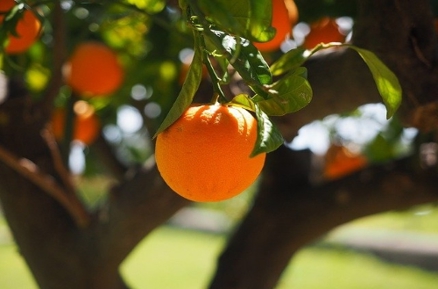Laws relating to fruit ripening on trees beginning of winter of Shemitah

What are the halachot related to fruit the ripens on the trees at the beginning of Shemitah? How do you take Terumot and Ma'aserot from them? Till when they are "Shishit" produce?
Many people have grapefruit, orange trees and other citrus tree in their gardens with fruit that are starting to ripen (Cheshvan 5782). Which laws apply to these fruit? Are they exempt from terumot and ma'aserot? Do they have kedushat shevi'it? Do I declare them ownerless?
While vegetables assume the status of kedushat shevi'it the moment they are harvested during the shemitah year, with fruit it is a different story. The determining stage for fruit vis-a-vis shemitah laws is the beginning of its development. This stage is called chanatah (חֲנָטָה).
Fruit that began to develop before Rosh Hashanah, such as grapefruits and oranges, is considered sixth-year fruit.
Sixth-year fruit is obligated in terumot and ma'aser ani (poor man's tithe). It does not have kedushat shevi'it.
The fruit belongs to you and you do not have to declare it ownerless.
You can harvest it in the regular fashion (large amounts at a time).
Fruit becomes shemitah produce if it began to develop during the shemitah year (from Rosh Hashanah and on).
For exact dates when each type of fruit begins to have kedushat shevi'it, see our shemitah calendars: https://en.toraland.org.il/beit-midrash/articles/shemitah/shemitah-calendars/shemitah-calendar-for-fruit/
Lemon trees and shemitah laws
I have a lemon tree. Some of the fruit began to develop before Rosh Hashanah, while some began to develop afterward. How do I keep track of the lemons that belong to the sixth year and the shemitah lemons? Which laws apply to them?
Answer:
We consulted our agronomists, Dr. Mordechai Shomron and Yehuda Heller, on this excellent question. They answered as follows:
Any lemon that is 2 cm or smaller at this point of the year (Cheshvan 5782) began to develop during shemitah. The laws of shemitah will pertain to it (kedushat shevi'it, hefesd, hefker, bi'ur). It will be exempt from terumot and ma'aserot.
Any lemon that is larger than this, certainly belongs to the sixth-year and is obligated in terumot and ma'aser ani (with a blessing). Shemitah laws do not apply.
At this point in the year, where it's still pretty obvious, it's a good idea to tie a string/rope around branches with the minority batch of fruit (if most are now sixth-year, then mark the seventh-year fruit, and vice-versa).
If this is not feasible or it's hard to tell:
1. Any lemons that ripen before 15 Adar II (Purim) are sixth-year. If you have a big batch of lemons that are ripening around this time, and a few that will ripen a bit after this time, mark the minority batch (see above) or pick the ones that are ripe before this date.
2. Bedi'avad, if you did not mark them, from Purim🎭 until Shavuot🥛 this year, take terumot and ma'aserot (ma'aser ani) without a blessing on the one hand, but also handle as kedushat shevi'it just in case.
3. When picking lemons from Purim to Shavuot: If you pick several at a time, take terumot and ma'aseot from the lemon that looks the ripest, to ensure that you are using a lemon that is more likely obligated (has a better chance of being a sixth-year lemon) to exempt the others.
4. If you aren't sure, just do your best (Torah was not given to angels.) 😇
5. From Shavuot on, hang up a sign that your lemons are ownerless. All shemitah laws apply.
Separating terumot & ma'aserot from citrus fruit in my garden
Fruit that ripens in early winter (primarily citruses) during the shemitah year is halachically considered sixth-year fruit. It does not have kedushat shevi'it, so it need not be declared ownerless. This fruit is obligated in terumot and ma'aserot. Ma'aser ani (poor-man's tithe), and not ma'aser sheni, should be separated this year, as is the rule for all sixth-year produce.
How do we separate terumot and ma'aserot?
See here for the text.
Each time you pick fruit and bring it inside, separate a bit more than 1% of the fruit. If you pick 10 lemons, set aside a bit more than 10% of one of them.
Say a blessing and the text for separating terumot and ma'aserot (see below): terumah gedolah, terumat ma'aser, and ma'aser ani.
Afterward, double bag the 1% and place it respectfully in the garbage.
If you are a member of Beit HaOtzar, the ma'aser fund of Torah VeHa'aretz Institute (or any other such fund), you actually give the ma'aser rishon to a pedigreed Levite and ma'aser ani to a poor person, approved by the institute's rabbis.
If you are not a member and are not interested in joining, you should optimally give 9% of your lemons to a Levite and another 9% to a poor person. It's generally not practical to do so. For this reason, many are lenient and give the value of the ma'aser rishon to charity and the value of the ma'aser ani to a poor person.
(It's not sufficient to give it to a charity box in your synagogue—it actually has to reach a poor person).
To join Beit HaOtzar, click here.
If you've never separated terumot or ma'aserot before, there are opinions that you should say shehechiyanu, just like for any mitzvah you perform for the first time!




